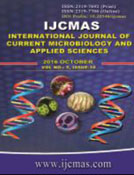


 National Academy of Agricultural Sciences (NAAS)
National Academy of Agricultural Sciences (NAAS)

|
PRINT ISSN : 2319-7692
Online ISSN : 2319-7706 Issues : 12 per year Publisher : Excellent Publishers Email : editorijcmas@gmail.com / submit@ijcmas.com Editor-in-chief: Dr.M.Prakash Index Copernicus ICV 2018: 95.39 NAAS RATING 2020: 5.38 |
Diabetes is a metabolic disorder which leads to hyperglycemia due to impairment of insulin secretion, insulin function or both. Cumin is a spice which is widely used all over the world. The recent research indicated that, cumin has positive and significant effect on blood glucose and total antioxidant capacity in Type 2 Diabetes patients. Hence, in the present study we aimed to assess the antidiabetic properties of ethanolic extract of cumin seeds through evaluation of in-vitro alpha-amylase and alpha-glucosidase activities inhibition assay. Results revealed that in an alpha-amylase inhibitory assay with of ethanolic extract of cumin seeds at a concentration range of 5µg/ml, 10µg/ml, 15µg/ml, and 20µg/ml, shown inhibition effect in the percentage of 3.85, 4.58, 6.25, and 7.56 respectively with an IC50 value of 12.28 µg/ml in comparison with the standard antidiabetic drug acarbose with an IC50 value of 20.82 µg/ml. Similarly, in an alpha-glucosidase inhibitory assay with ethanolic extract of cumin seeds at a concentration range of 5µg/ml, 10µg/ml, 15µg/ml, and 20µg/ml, shown inhibition effect in the percentage of 4.68, 5.38, 7.18, and 8.45 respectively with an IC50 value of 14.58 µg/ml in comparison with the standard antidiabetic drug acarbose with an IC50 value of 21.18 µg/ml. In conclusion, the results of present preliminary study clearly demonstrated that the cumin extract possess antidiabatic properties. Hence, it could be recommended that cumin seeds could be employed for the management of Type 2 Diabetes and could be considered for development of natural anti-diabetic drugs.
 |
 |
 |
 |
 |